Anatomy Of A Fall: Justine Triet's Taut Courtroom Drama Summons Truth To The Witness Stand
When her husband is found dead in ambiguous circumstances, a writer finds herself put on trial not only as a murder suspect, but also for her gender, lifestyle, success and choices.
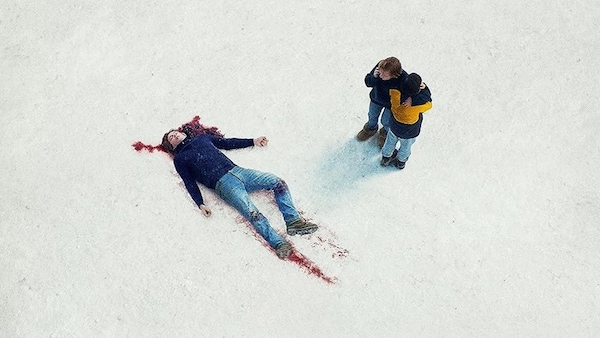
Last Updated: 04.01 PM, Dec 06, 2023
This column was originally published as part of our newsletter The Daily Show on December 6, 2023. Subscribe here. (We're awesome about not spamming your inbox!)
***
Editor's note: Over the next few weeks, and as we count down to the new year, we'll be discussing some of 2023's best films and shows. Stay with us on this journey, to assess your end-of-year watchlist.
“What do you want to know?”
Justine Triet’s Anatomy of a Fall begins with this simple but probing query that doubles as its thesis statement: about the unknowable truth of a relationship to those outside it, more so when facts can be recast in conflicting ways. The query is posed by novelist Sandra (Sandra Hüller) to graduate student Zoé (Camille Rutherford) in the cosy living room of a chalet overlooking the French Alps. Zoe is there to interview Sandra with a keen focus on how she straddles the line between personal truth and fiction in her work. Tipsy and feeling a little flirty, the older writer keeps turning the table on the younger woman, often redirecting the questions. “What I do know is my interest in you,” Sandra teases.
Upstairs, a steel drum version of 50 Cent’s “P.I.M.P.” blasts on repeat, interrupting their conversation. It is no teenage act of defiance, but a spousal act of passive aggression. It is Sandra’s husband, Samuel (Samuel Theis), making his displeasure known quite loudly. She however, keeps her calm and smiles through the disturbance, until she is left with no choice but to cut the interview short. Zoé leaves. As if sensing a domestic storm brewing, the couple’s visually-impaired 11-year-old son Daniel (Milo Machado-Graner) takes the dog for a walk. On his return, he stumbles upon his father’s lifeless body at the foot of the chalet, lying face up in the blood-stained snow. Was it an accident, suicide or murder? Despite next to no conclusive evidence, Sandra is indicted for murder.
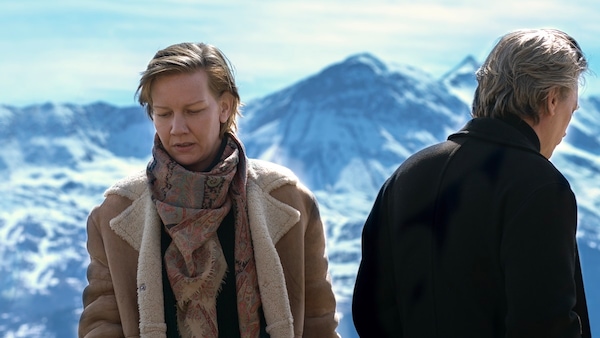
This literal culmination of a marriage falling apart sets the stage for a courtroom drama of guessing games. As the prosecutor (Antoine Reinartz) dissects layer after layer to reveal the matrimonial clot that drove Sandra and Samuel’s relationship to the precipice of death, he also stretches the facts to fit his narrative. For motive, he also puts on trial Sandra’s bisexuality, her maternal capabilities, and her literary success. Triet and co-writer Arthur Harari use his judgments to anatomise: how double standards affect the personal and professional lives of successful women; how the reversal of gender roles influences the presumption of innocence and relaxes the burden of proof; how truth is slippery and relative. To this end, the film doesn’t show us exactly how Samuel died. Nor does it offer a firm declaration of Sandra’s guilt/innocence. By sustaining that ambiguity and not letting any “OBJECTION” be raised, Triet keeps the dramatic tension simmering.
All the dirty laundry looks dirtier when aired in the courtroom. Imagine the horror of having your choices and mistakes, some more regrettable than others, being taken out of context, reframed through a parochial lens, and judged by everyone in a public space. If that wasn’t painful enough, Sandra must face the horror with her son seated in the gallery. The prosecution brings up intimate details of her relationship with Samuel, one marred by guilt, resentments, professional rivalry and extramarital affairs, all of which she is ordered to explain without the mitigative interjections of her defence attorney.
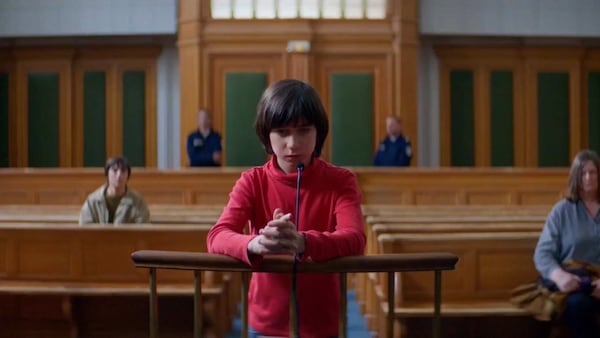
Guilt and resentments grew from the accident which cost Daniel his eyesight. Rivalry grew over Sandra’s flourishing literary career and Samuel’s struggles to put pen to paper. That she cheated out of frustration from a sexless marriage is used by the prosecution to suggest what else she may have been dishonest about. That she borrowed an idea from Samuel’s abandoned novel as a jumping-off point for her own novel is used to further strengthen their suggestion. That she switches from French to English (a language she is more comfortable speaking), as she gives her testimony, distances her from the French public — a case of linguistic ostracism. That she is German, bisexual, successful, and doesn’t apologise for her success or her husband’s lack thereof, is used to position her as a cold, uncaring suspect, rather than a widow benumbed with grief. Hüller’s unwavering gaze confronts the audience’s own reading of guilt and innocence based on gendered expectations, and how Sandra’s nonfulfillment of those expectations jeopardises her credibility in court. As a woman who is as inscrutable as articulate, the German actor embodies the film’s own ambivalent disposition. The destabilising movements of a ping-pong-ing and zooming camera serve a similar function.
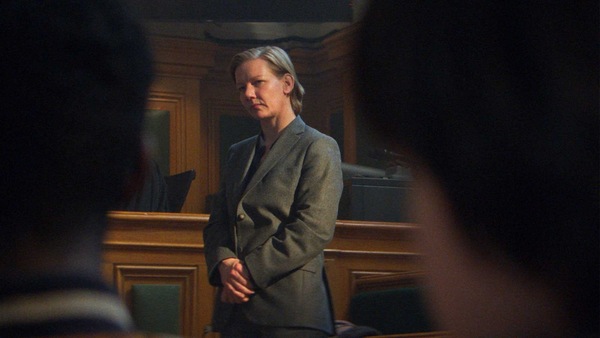
The idea of a perfect crime has fascinated many a writer to construct puzzle boxes of clues and misdirection. Paradoxically, making up murderous schemes as a literary exercise also makes a writer a prime target of suspicion. Being an autofiction writer makes Sandra all the more suspicious in the eyes of the prosecution. At one point, a passage from one of her novels where a character ponders murder is used against her. Furthermore, Sandra’s tendency to draw from lived experience in her fiction ends up playing a part in her indictment. The prosecution, on the other hand, draws up whatever facts and evidence in their possession to spin their own narrative. For Sandra, the challenge is to confront the presumptions of those who readily conflate her fiction with her reality. As the courtroom autopsy of her broken marriage gets underway, as words of the law pierce and probe like a scalpel, the challenge isn’t an easy one. But she must face up to it, blame by blame. When Samuel’s therapist asserts her role in his depression, if not death, she rightly suggests how easy it would be for her to find a therapist who could rebut his assertions.
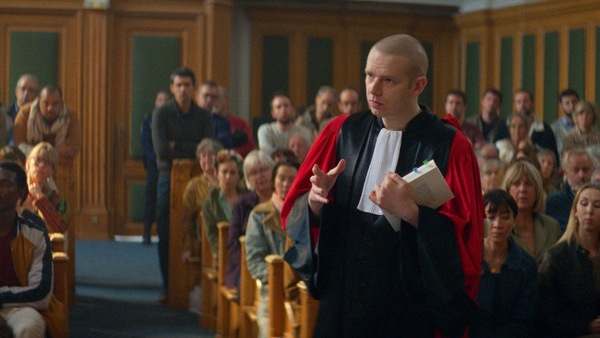
Marital tensions had boiled over in a heated argument between the couple the day before the fall — an audio recording of which is introduced in court, before a flashback shows the event horizon in all its escalating fury. A kitchen becomes the site of a marital implosion years in the making. Samuel complains about being unable to find time for himself, being swamped with family duties, being blamed for Daniel’s accident, being made to speak English, and being cuckolded. Sandra counters with the compromises she has made for his happiness, which included moving to his hometown of Grenoble so he could find the time to write. If she doesn’t speak in her native tongue of German or he in French, it’s because English presents common ground. If she cheated on him, it was her way of finding a solution to her frustration. “Sex,” she insists, was nothing more than “a matter of personal hygiene.” Soon, microaggressions erupt into overt aggression. Once the threat of violence devastates the groundwork of possible reconciliation, Trier cuts to the trial again. We don’t see the confrontation; we only hear it. The decision to cut earlier exposes the gap between the truth as presented by a flashback and the truth as presented through evidence and testimony. The gap can only be bridged by our perception of the couple’s relationship and our imagination of what might have happened the day of the fall. It testifies to how no court of law is ever privy to the truth, the whole truth, and nothing but.
The more young Daniel learns about his parents’ relationship, the less certain he is about how it ended. As he listens to different testimonies and learns unfamiliar facts about his parents, he learns his own experience is not the whole truth. But it does have the power to confirm the truth. During one of the testimonies, the prosecution conjectures how Sandra may have killed Samuel, and the images echo in Daniel’s mind. It makes us realise how easily other people’s perceptions can overwrite our own experience. Sitting through the trial forces Daniel, and the viewer watching, to reconsider the trust we place in our senses. What our senses allow us to experience may not accurately reflect what happened. Truth can exist independent of observation, whether we know it, assume to know it, want to know it — or not.
Anatomy of a Fall won the Palme d'Or at the 2023 Cannes Film Festival. The film had its India premiere at this year's MAMI Mumbai Film Festi val as part of its World Cinema section, and was also screened at the recently concluded edition of IFFI Goa.

 Premium
Premium